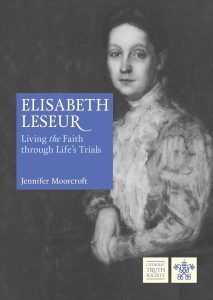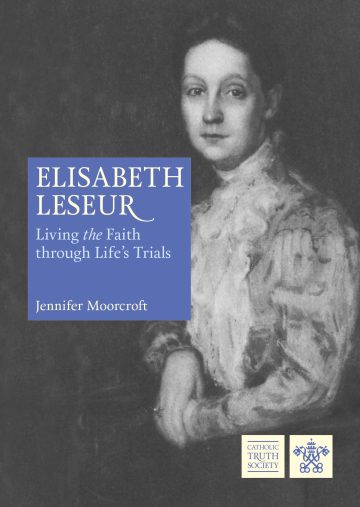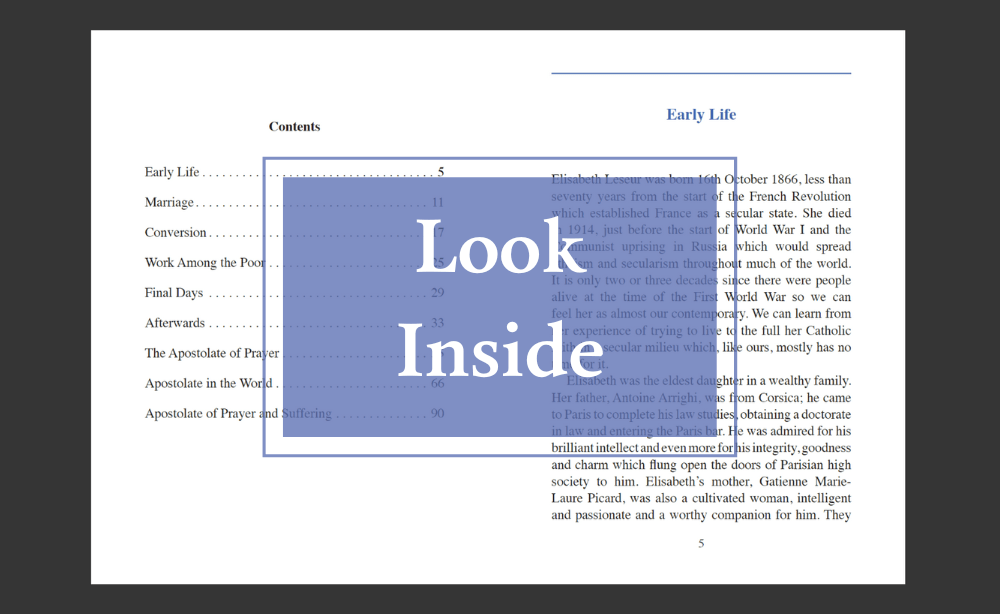
Elisabeth Leseur: Living the Faith through Life’s Trials
Discover French mystic Servant of God Elisabeth Leseur, whose spiritual writings and deep faith converted her atheist husband after her death.
Elisabeth Leseur: Living the Faith through Life’s Trials
The life of French mystic Servant of God Elisabeth Leseur was marked by adversity and moments of sorrow. Her husband, Felix, had not only lost his faith but actively sought to destroy hers. Despite these challenges, Elisabeth steadfastly maintained her love for her husband and prayed ardently for him.
Unbeknownst to her husband, Elisabeth secretly documented her spiritual insights within her journals and letters. After her life was tragically cut short by cancer, he discovered and lovingly catalogued the treasure trove of wisdom she had left behind. Influenced by the profound content of her writings, Felix converted and became a priest.
This book not only presents reflections on carefully chosen passages from Elisabeth’s letters and journals, but also delves into the extraordinary example of patient and profound love she exhibited throughout life’s tribulations. Through these pages, readers have the opportunity to draw inspiration from Elisabeth’s life and, much like Felix, undergo a personal journey of transformation and conversion.
Format: A6 Paperback Price: £3.95
Order Now
Inspiring Quotes from Elisabeth Leseur’s Writings
Whoever wishes to lead a truly Christian life must first exert his will, and so regulate his existence as to put the most important things foremost. I think that nothing is more important in the use of our days than the time given first of all to God. It may be very short, as a few minutes are enough every morning for us to offer up our thoughts, deeds and word, and all that wealth of sufferings which becomes daily a source of grace to the souls on whose behalf we offer it.… Add to this ten minutes or a quarter of an hour devoted to reading and meditating on some passage, and your morning and night prayers, and all together they do not amount to one hour given to God out of the twenty-four. Is it really too much to ask of so good a Christian as yourself?
(Letter to her mother, 31st August 1907)
I felt in myself the living presence of the blessed Christ, of God Himself, bringing me an ineffable love; this incomparable Soul spoke to mine, and all the infinite tenderness of the Saviour passed for an instant into me. Never will this divine trace be effaced. The triumphant Christ, the eternal Word, He who as man has suffered and loved, the one living God, took possession of my soul for all eternity in that unforgettable moment. I felt myself renewed to my very depths by Him, ready for a new life, for duty, for the work intended by His Providence. I gave myself without reserve, and I gave Him the future.
(Diary, Part 1, 23rd July 1903)
I want to be a Eucharistic soul, a hidden apostle of the divine Heart to practise complete, confident, and loving abandonment. To go to God by means of the Cross. Through the Heart of Jesus, under the sweet maternal protection of Mary. Whatever it may be, let the future be welcome, since it comes from the heavenly Father and the one Friend. As the future becomes the present, it will bring me its own necessary graces. Until then, and rven afterwards I must remember that ‘sufficient unto the day is the evil thereof’ and that the present day is the one during which I can work and suffer for souls, for the glory of God.
(Diary, Part 2, 17th February 1913)
The further I go, the more convinced I am of the complete uselessness of religious discussions with unbelievers. The intellectual and historical point of view, which is all they have, is inadequate to the phenomena of the interior life. All that is profound, subtle, and alive in the human soul is unknown to them. They are even unaware of their own interior depths. Let us look for ways to arouse in them a sense of eternal things, let us search with them for the divine spark, let us open wide for them the path of the good, which leads to God, without encumbering them with barriers and obstacles. That will be enough. Then let us ardently pray, and Providence will do the rest.
(Daily Thoughts, 1899-1906)
Order Now: Elisabeth Leseur: Living the Faith through Life’s Trials
Who was Elisabeth Leseur? Key Facts:
1. She was a strong-willed child with a ‘spirit of contradiction’.
Elisabeth was born in Paris in 1866, the eldest daughter in a wealthy family. She was a lively, strong-willed and intelligent girl who was only too aware of her faults, her ‘spirit of contradiction’, her unwillingness to admit when she was in the wrong and her tendency to being a tease; her brother Pierre was mostly the butt of her teasing and also of their quarrels.
2. She met her husband Félix at a soirée.
One evening, Elisabeth attended a soirée. Also, there was Félix Leseur, a young student doctor. The chemistry between the two was so immediate, so electric, that the whole room felt it. Elisabeth had just turned twenty-one and Félix was five years older. They found they had much in common, in their love for the arts and in travel. Their later engagement came to the delight of both their families, and they were married on 31st July 1889.
3. She was unable to have children.
Soon after the couple returned from their honeymoon, Elisabeth developed an abdominal abscess, which could lead to peritonitis, usually fatal at that time. She was bedridden for several months, and because of her internal problems the young couple were given the devastating news that Elisabeth would never be able to have children. This was an abiding sorrow for them both; Elisabeth came to terms with the loss in her own special way by lavishing her love on the children in her extended family and on the children she would meet in her work.
Order Now: Elisabeth Leseur: Living the Faith through Life’s Trials


